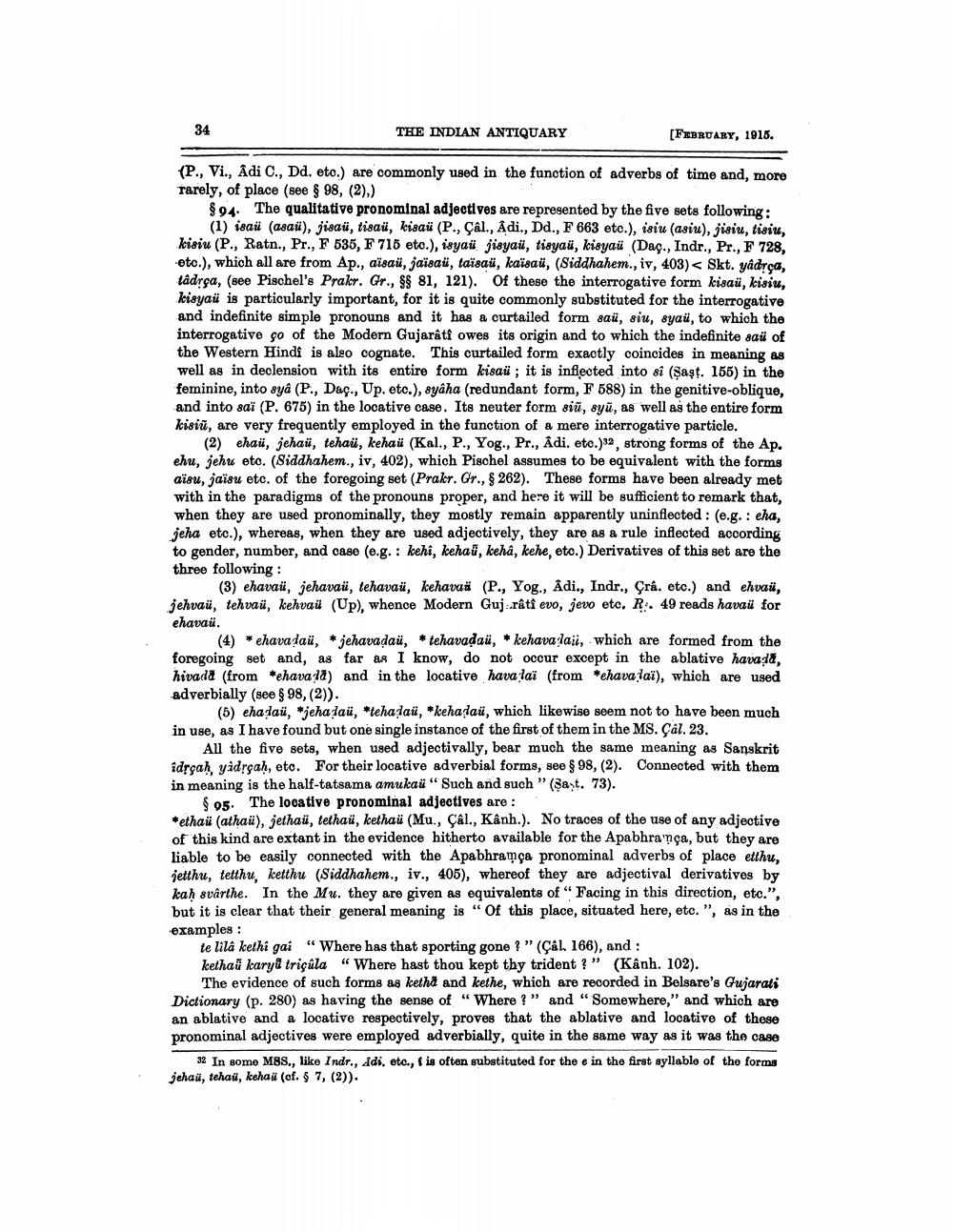________________
34
THE INDIAN ANTIQUARY
[FEBRUARY, 1918.
(P., Vi., Adi C., Dd, etc.) are commonly used in the function of adverbs of time and, more rarely, of place (see $ 98, (2),)
$94. The qualitative pronominal adjectives are represented by the five sets following:
(1) isait (asai), jisai, tisaü, kisaü (P., Çal., Adi., Dd., F 663 etc.), isiu (asiu), jisiu, tisiu, kisiu (P., Ratn., Pr., F 535, F 715 etc.), isyau jisyaü, tisyaü, kisyaü (Daç., Indr., Pr., F 728, etc.), which all are from Ap., aïsaü, jaïsaü, taïsaü, kaïsaü, (Siddhahem., iv, 403) < Skt. yadrça, tadrga, (see Pischel's Prakr. Gr., $S 81, 121). Of these the interrogative form kisaü, kisiu, kisyaü is particularly important, for it is quite commonly substituted for the interrogative and indefinite simple pronouns and it has a curtailed form sai, siu, syai, to which the interrogative co of the Modern Gujarati owes its origin and to which the indefinite saü of the Western Hindi is also cognate. This curtailed form exactly coincides in meaning as well as in declension with its entire form kisaü; it is inflected into si (şaşt. 155) in the feminine, into sya (P., Dag., Up. etc.), syaha (redundant form, F 588) in the genitive-oblique, and into saï (P. 675) in the locative case. Its neuter form siū, syu, as well as the entire form kisiū, are very frequently employed in the function of a mere interrogative particle.
(2) ehaü, jehau, tehaü, kehaü (Kal., P., Yog., Pr., Adi. etc.)32, strong forms of the Ap. ehu, jehu eto. (Siddhahem., iv, 402), which Pischel assumes to be equivalent with the forms aisu, jaisu etc. of the foregoing set (Prakr. Gr., $262). These forms have been already met with in the paradigms of the pronouns proper, and here it will be sufficient to remark that, when they are used pronominally, they mostly remain apparently uninflected : (e.g. : eha, jeha etc.), whereas, when they are used adjectively, they are as a rule inflected according to gender, number, and case (e.g.: kehi, kehau, keha, kehe, etc.) Derivatives of this set are the three following:
(3) ehavaü, jehavaü, tehavaü, kehavä (P., Yog., Adi., Indr., Çra. etc.) and ehvaü, jehvaü, tehvaü, kehvaü (Up), whence Modern Gujarati evo, jevo eto. R. 49 reads havaü for ehavaü.
(4) *ehavadai, *jehavadaü, * tehavadaü, * kehava laii, which are formed from the foregoing set and, as far as I know, do not occur except in the ablative havada, hivada (from *ehavada) and in the locative hava laï (from *ehavalai), which are used adverbially (see 898, (2)).
(5) ehadaü, *jeha daü, *tehadaü, *kehadaü, which likewise seem not to have been much in use, as I have found but one single instance of the first of them in the MS. Çal. 23.
All the five sets, when used adjectivally, bear much the same meaning as Sanskrit idrçah, yirgah, eto. For their locative adverbial forms, see $ 98, (2). Connected with them in meaning is the half-tatsama amukaü" Such and such " (Bat. 73).
05. The locative pronominal adjectives are : *ethaü (athai), jethau, tethaü, kethaü (Mu., Çal., Kênh.). No traces of the use of any adjective of this kind are extant in the evidence hitherto available for the Apabhrança, but they are liable to be easily connected with the Apabhramça pronominal adverbs of place etthu, jetthu, tetthu, ketthu (Siddhahem., iv., 405), whereof they are adjectival derivatives by kaḥ svarthe. In the Mu. they are given as equivalents of "Facing in this direction, etc.", but it is clear that their general meaning is “Of this place, situated here, etc.", as in the examples :
te lila kethi gai “Where has that sporting gone?" (Çâl. 166), and : kethau karyl trigûla “Where hast thou kept thy trident ?" (Kênh. 102).
The evidence of such forms as ketha and kethe, which are recorded in Belsare's Gujarati Dictionary (p. 280) as having the sense of "Where?" and "Somewhere," and which are an ablative and a locative respectively, proves that the ablative and locative of these pronominal adjectives were employed adverbially, quite in the same way as it was the case
32 In some M8S., like Indr., Adi, etc., f is often substituted for the e in the first syllable of the forms jehaü, tehaü, kehaü (of. § 7, (2)).




